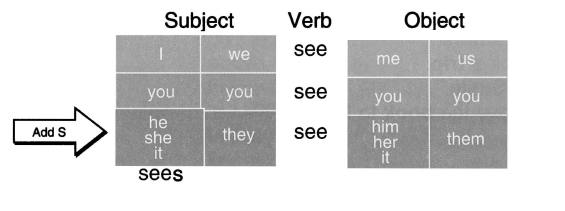Now that we understand what nouns are, let's make them more interesting. Saying "He has a car" doesn't tell us much. We need to add more details to the noun, like "a new car" or "an old car." Also, remember to emphasize the noun when you're sharing new information, like "It's a new car."
New Information
Listen and repeat five times, focusing on the intonation.
1. He has a blue pen.
2. She seems like a nice person.
3. You take long walks.
4. I like my red coat.
5. She plays two instruments.
You can also use contrast by stressing the modifier: It's a new car, not an old one.
New Information and Contrast
Listen and repeat five times, focusing on the intonation.
New Information Contrast
1. He has a blue pen. He has a blue pen, not a black one.
2. She seems like a nice person. She seems like a nice person, but she is not.
3. You take long walks. You take long walks, not short ones.
4. I like my red coat. I like my red coat, but I love my blue one.
5. She plays two instruments. She plays two instruments, not three.
In the story about Max, you might have seen words like "bodybuilder," "girlfriend," and "parking lot." When two nouns come together to make a new word, it's called a compound noun. Remember, the stress is on the first noun: "bodybuilder," "girlfriend," "parking lot."
Descriptions
Listen and repeat five times, placing the emphasis on the second word.
1. It's a metal clip. 6. It's a thick book.
2. It's a good book. 7. It's fresh sauce.
3. It's a plastic cup. 8. It's a bronze pot.
4. He's a little boy. 9. It's a paper plane.
5. It's a rusty can. 1 0. It's an expensive grater.
Compound Nouns
Listen and repeat five times, placing the emphasis on the first word.
1. It's a paper clip. 6. It's a notebook.
2. It's a bookshelf. 7. It's hot sauce.
3. It's a coffee cup. 8. It's a teapot.
4. He's a cowboy. 9. It's an airplane.
5. It's a trashcan. 10. It's a cheese grater.
Contrasting Descriptions - Compound Nouns
Listen and repeat five times, focusing on the intonation.
Descriptions Compounds
1. It's a metal clip. It's a paper clip.
2. It's a good book. It's a bookshelf.
3. It's a plastic cup. It's a coffee cup.
4. He's a little boy. He's a cowboy.
5. It's a rusty can. It's a trashcan.
6. It's a thick book. It's a notebook.
7. It's fresh sauce. It's hot sauce.
8. It's a bronze pot. It's a teapot.
9. It's a paper plane. It's an airplane.
10. It's an expensive grater. It's a cheese grater.
Max Revisited
Listen and repeat five times, focusing on the difference between descriptions and compounds.
I'm a bodybuilder. One day, I'm in Gold's Gym in Venice, California. After training, I go to the parking lot. Suddenly, I hear three gunshots. There are three guys. One of them has a gun. He shoots a man! I think that they're in a gang. It's really dangerous. I go home. Fortunately, I'm not hurt. My girlfriend, Eve, is careful, but she's used to living in Venice.
Let's quickly go over nouns and pronouns. For "he," "she," and "it," add "-s" to the main verb.

Noun and Pronoun Review - Pronunciation
Listen to the audio and repeat five times.
Nouns Pronouns
1. Suzee stədeez French. She stədee zit.
2. Thee(Y)employeez need breaks. They need'm.
3. Students ælsk kwesj'nz. They æsk'm.
4. The child breaks hiz toy. He break sit.
5. Your perents may kə phone call. They may kwən.
6. The CEO frgets hiz plæn. He frget sit.
7. Cəmmyuderz take trains. They take'm.
8. My s'strr wantsə new car. She wänts wən.
9. Yrrrr mäm likes t' cook pæncakes. She likes to cook'm.
10. The dagz need worm bæthz. They need worm wənz.
Replacing Nouns
Rewrite each sentence, replacing all nouns with pronouns.(The stress moves from the nouns to the verbs. )
Edward likes his classes. He likes them.
1. Joe and Frank saw a movie.
2. Tammy plays tennis.
3. Mary and I took a trip.
4. Dave married Susie.
5. Our friends gave the book to Ed and me.